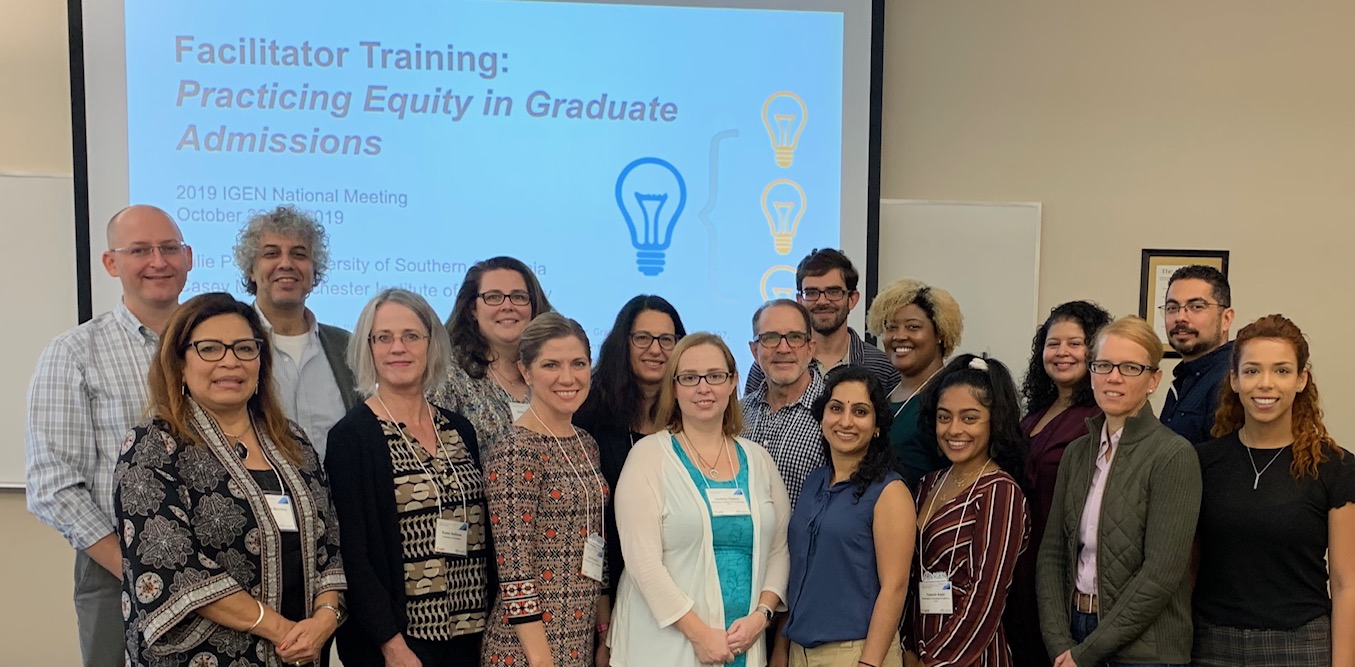In 2018, USC Associate Professor Julie Posselt saw a pressing need for a scalable, sustainable system for faculty to learn about basic issues of inequality and justice in graduate education. Posselt believed this type of system was necessary for advancing racial equity and diversity, and could serve as a catalyst for systemic and cultural change in doctoral education. Soon, the California Consortium for Inclusive Doctoral Education (C-CIDE) was developed.
The initial partnership included campus leaders from six California institutions, with funding provided by a National Science Foundation Innovations in Graduate Education grant. Together, they created and delivered research-rich workshops to encourage reflection, discussion, and change to admissions processes. This is complemented by ongoing coaching for leaders in change management, a learning community of graduate school administrators, and a facilitator training through which universities can host such workshops themselves.
Four years later, as the nation and graduate education community grapple with impacts of COVID-19 and a rise in racial violence, more universities and graduate programs across the country have expressed their desire to participate in the C-CIDE community and benefit from its resources. As a result, the Consortium is expanding to meet this need.
With support from the Alfred P. Sloan Foundation, C-CIDE is scaling-up nationally under our new name, the Equity in Graduate Education Consortium. The newly-expanded Consortium builds on the knowledge developed in C-CIDE and will provide additional opportunities for professional learning and development for partners in two tracks:
1) Admissions and Recruitment
2) Mentoring and Wellbeing
In each track, partner universities will engage in a professional learning community where they explore common challenges, and develop a theory of improvement to address these issues in ways that will resonate with their local campus communities. As of April 1, the pilot and new institutions include:
- Boston University
- Columbia University
- Cornell University
- Georgia Institute of Technology
- Northwestern University
- University of California – Berkeley
- University of California – Davis
- University of California – Irvine
- University of California – Santa Barbara
- University of California – San Diego
- University of Illinois at Urbana-Champaign
- University of Rochester
- University of Southern California
On each campus, activities are targeted at 4-6 change-ready PhD programs, whose success in doing so is noteworthy for the campus.
Posselt continues as Director, while Steve Desir directs Professional Development and Learning, and Yasmin Kadir is managing operations. The project works closely with two administrative liaisons from each campus and has trained 18 facilitators total thus far. These leaders participate in and facilitate high-quality faculty development experiences that use data and research to document how typical mindsets and behaviors in admissions, recruitment, mentoring are racialized and gendered. Consortium workshops have provided opportunities for faculty and administrators to reflect upon and discuss their standard practices; learn current evidence and law; and change their program’s policies and practices to align with their commitments toward equity and diversity.
Describing what makes the expansion of this project promising, Kadir noted its “collaborative and reaffirming nature [which] provides institutional leaders with the community support that equity-minded organizational change thrives in. The collective space to continuously learn, exchange tools, and work towards a shared vision has shown to strengthen individual campus efforts.” Through the Consortium’s culture, faculty within graduate programs and administrators within graduate schools are supported in being the change agents needed to equitably select and serve groups that have been marginalized in graduate education.
Over time, the Consortium has learned a great deal about how to put organizational learning to work in the service of institutional change. A graduate dean noted, “In just one year, C-CIDE has given me more traction than I could have done on my own.” The Consortium’s research, evaluation, and assessment activities have found that the 27 participating programs in the pilot:
1). Experienced an increase in the number and fraction of racially minoritized applicants, admittees, and enrolled students;
2). Increased use of inclusive recruitment and holistic admission practices; and
3). Have sustained these changes for 3+ years.
The Equity in Graduate Education team at the Pullias Center is looking forward to expanding their reach, deepening their work and working with new partners in the coming years. To follow their progress, or to learn more about the Equity in Graduate Education Consortium please visit our website at www.EquityGradEd.org.
